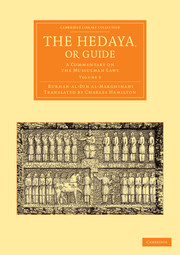
-
Select format
-
- Publisher:
- Cambridge University Press
- Publication date:
- 05 July 2014
- 28 February 2013
- ISBN:
- 9781139506496
- 9781108055376
- Dimensions:
- Weight & Pages:
- Dimensions:
- (297 x 210 mm)
- Weight & Pages:
- 1.47kg, 624 Pages
You may already have access via personal or institutional login- Subjects:
- Legal History, Area Studies, South Asian History, Law, Asian Studies, History
Book description
Composed in the twelfth century by the leading Muslim jurist Burhan al-Din al-Marghinani (1135–97), the original Arabic al-Hidāyah remains a central text of Islamic personal law. This English translation, from a Persian version of the work, was prepared by the orientalist Charles Hamilton (c.1752–92) for the East India Company in 1791. Although since superseded, it remains a fascinating document in the history of colonial jurisprudence. The legal system was central to the entrenchment of British rule in India, providing the framework for active control of civil administration and the courts. Translations of Islamic texts were intended to remove the language barrier for colonial officials, and blurred British and native law for the first time. Volume 3 contains sections on agency, claims, laws of business, deposits, loans, gifts, the hiring of slaves, freed slaves, and disputed land sales.
Contents
Metrics
Full text views
Full text views help Loading metrics...
Loading metrics...
* Views captured on Cambridge Core between #date#. This data will be updated every 24 hours.
Usage data cannot currently be displayed.
Accessibility standard: Unknown
Why this information is here
This section outlines the accessibility features of this content - including support for screen readers, full keyboard navigation and high-contrast display options. This may not be relevant for you.
Accessibility Information
Accessibility compliance for the PDF of this book is currently unknown and may be updated in the future.

